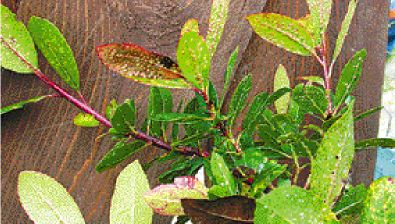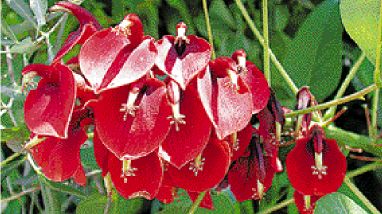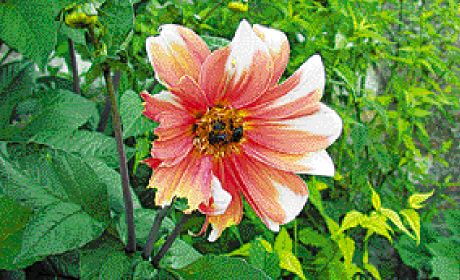 |
||
|
Think before you spray |
||
|
by Jennifer Gay If you must use chemicals in your garden, follow these basic rules for safety and efficiency |
||
| governments have changed their minds over the years on what is considered safe doesn't inspire much confidence either. It wasn't so long ago that DDT was being widely used and Rachel Carson's book Silent Spring was regarded as fringe reading. |
||
In fact, I was sparked into writing this piece through witnessing a (clearly) untrained employee of a garden company (to remain nameless) spraying chemicals without regard for one single item on the list of safety precautions that you'll find at the end of this article, making what he was doing potentially unsafe for himself but also those around. The entire garden, including vegetables, was sprayed, immaterial of the presence of pests and diseases, with Malathion, a chemical requiring at least the use of rubber gloves and a mask. The minimum period for harvesting after spraying Malathion is four days; the owner of the garden may never have known had I not alerted her to what I'd seen. This is not a one-off incident; it happens daily in Greece. Like safety on building sites,there is a macho gung-ho attitude to garden chemicals. |
 Watch out for pests in spring when they become active. Remember that it's much easier to get rid of problems culturally/biologically before you lose control -small populations of scale on evergreens such as strawberry tree can be pruned out |
|
| If you spray chemicals as part of your job (in public or private places), health and safety laws in many EU countries require a proficiency spraying certificate proving safe use of pesticides. Even is such laws exist here, they are clearly not being implemented. Even if you don't use garden chemicals yourself perhaps someone working in your garden does; they may be uninformed about what they are using. It is now illegal in some EU countries for gardeners to use chemicals other than in accordance with the instructions provided; this makes it illegal to use the wrong dilution rate and also to use the product for purposes other than those stated on the instructions. Such jurisdiction would be welcome in Greece where wrongful use of chemicals is widespread. Prosecutions have resulted in the UK: careless spraying of flowering plants resulting in a beekeeper losing his bees can see you in court. |
||
With few exceptions garden chemicals are not selective. Most insecticides have a board spectrum of activity and will kill beneficial predator insects along with the pests, possibly resulting in the pest returning in greater numbers than before. Repeated use of pesticides can also result in development of resistance; there is a growing list of pests and diseases which are no longer controlled by chemicals once effective against them. Some chemicals are residual - they are slow to break down and therefore potentially more damaging to the environment, while others are non-residual. The label should tell you what type of chemical you are dealing with. |
 The root-eating chafer grub can be controlled by picking it out of the soil as you dig in winter |
|
|
Chemicals may also be organic or synthetic. Whilst all are poisons, some people may prefer to use natural products, for example Pyrethrum extracted from the flower of Pyrethrum cinerariifolium.
Safe chemical use 1. Think before you spray. Identify the cause of the problem. There is no point in trying various insecticides and fungicides if the plant is actually suffering from malnourishment or growth defects caused by cold weather. 2. Sort out which problems are serious. Those causing little harm could be tolerated; does the presence of a couple of dandelions merit you spraying the whole lawn? Is spraying really necessary or could you use organic remedies or biological controls instead? 3. If you think you must use a chemical, choose it carefully; make sure it is the right one for the job. A chemical's relevance may be limited to certain types of plants or situations. 4. Apply the chemical at the right time. Pests often have one or more stages in their life when they are more vulnerable to chemical control. Spraying at the wrong time may give no control. 5. Apply the preparation at the rate and frequency stated on the label. 6. Never use any type of chemical on aquatic plants. 7. Inspect plants regularly so that problems are tackled before heavy infestations develop. 8. Don't use chemicals under windy conditions or if rain is imminent. Avoid treating plants exposed to bright sunlight or extremes of temperature as risk of scorch is increased. 9. Always spray in the evenings when there are few bees and hoverflies around. 10. Avoid contact with skin and eyes by wearing rubber gloves, long sleeved clothing, and goggles. Read the label and take further safety precautions as necessary. 11. Make sure the chemical does not drift into other people's gardens. 12. Keep pets and children away until safe to re-enter area. 13. Never eat, drink or smoke when applying chemicals. 14. Dispose of any excess carefully and wash out any apparatus thoroughly. Don't use apparatus for anything other than chemicals. 15. Store chemicals safely and out of reach of children and animals. Store in their original containers with their original labels and keep explanatory leaflets with them. The EU is continually reviewing chemicals and their use; sometimes a chemical is taken off the market for various reasons. New research may render it unsuitable for domestic use or a product may be superseded by an updated 'safer' one. You can check on www.pesticides.gov.uk to see if a chemical is approved for garden/home use. If it's not approved in the UK, you shouldn't be using it here as Greece should be following the same guidelines. |
||
| Flowering now Coral tree THE DECIDUOUS Coral tree (Erythrina crista-galli) is a beauty but can only be grown as a tree (or large shrub) in areas with mild winters, though in colder areas you can grow it as a herbaceous plant. The spiny branches are laden with long, clustered spikes of deep scarlet flowers, rather like waxen sweet peas, in summer and autumn. |
 |
|
|
Gardeners' queries |
||
|
|
||
(Posting Date 8 September 2006) HCS readers can view other excellent articles by this writer in the News & Issues and other sections of our extensive, permanent archives at the URL http://www.helleniccomserve.com./contents.html
All articles of Athens News appearing on HCS have been reprinted with permission. |
||
|
||
|
2000 © Hellenic Communication Service, L.L.C. All Rights Reserved. http://www.HellenicComServe.com |
||


